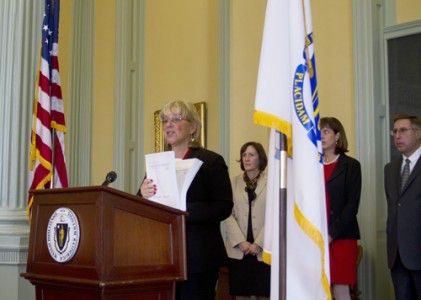After about two years of investigation, the Massachusetts Jobs Creation Commission outlined four main strategies to target economic growth and increase job numbers in the Commonwealth at a press conference Wednesday at the State House.

The report, the product of an investigation initially mandated in 2008, recommends that Massachusetts increase demands for goods and services, as well as state investment in infrastructure.
“It was to investigate how to create jobs in Massachusetts, and I think it did achieve that,” said Alan Clayton-Matthews, a professor and director of Quantitative Methods at Northeastern University and a commissioner, in an interview with The Daily Free Press. “It was pretty broad-based in its use of finding people who are knowledgeable about ways to increase the number of jobs.”
The report also recommended ensuring a properly skilled workforce by matching education and training to job demand, as well as ensuring workforce training programs and job search resources.
The commission, formed in 2008, was ordered to create “an investigation and study relative to the economy in order to create and maintain quality jobs in the Commonwealth,” according to the report.
Mass. Sen. Karen Spilka, of Ashland, co-chaired the commission with Mass. Rep. Joseph Wagner, of Chicopee.
The commission included 17 individuals, including legislators, business and labor representatives and economics professionals. It consisted of three subcommittees for inventory, demand and supply.
“Each focused on a major topic, an area critical to job creation and economic development,” Spilka said.
From Jan. 6, 2011, to July 25, 2012, the commission hosted hearings with help from local Workforce Investment Boards, according to the report.
Eight public hearings occurred all across the Commonwealth, Spilka said.
The hearings gave workers, businesses and human resource professionals the opportunity to voice their economic concerns and suggestions.
“We heard from employees, we heard from employers and we heard from folks that help and assist employees and employers,” Spilka said.
Commissioners also emphasized the need to further improve the quality of the Commonwealth’s workforce and stressed the need to create more jobs for middle-skilled workers who are currently unemployed.
“There’s nothing more friendly to business than a highly qualified, highly trained, highly skilled workforce, and that is a huge emphasis of this report,” said Richard Sullivan, secretary of the Executive Office of Energy and Environmental Affairs.
Although parts of the report might become legislation when the Massachusetts Legislature begins a new term in January, some of the commission’s findings are already under implementation, Spilka said in an interview with The Free Press.
“There may be pieces of this that we specifically file as new bills come January,” she said.
Spilka said the implementation of the Economic Development Jobs bill from this session is ongoing, among other initiatives.
The commission also examined unemployment among a wide array of demographic groups that might face employment barriers such as minorities, veterans, ex-convicts and people with disabilities.
Secretary Coleman Nee of the Department of Veterans’ Services spoke during the press conference about the attention the commission paid to veterans in their report.
“I think this report will go a long way, particularly along the translation of their military skills and helping these folks transition to commercial settings,” Nee said.
During the press conference, Spilka said the newest Massachusetts unemployment rates have appeared lower than the national rates, a fact she called “heartening” to hear.
While the U.S. Bureau of Labor Statistics announced August’s seasonally adjusted unemployment rate as 8.1 percent, the Mass. Executive Office of Labor and Workforce Development records the statewide rate at 6.4 percent.
“And yet we realize that not all folks who want a job have a job, or they may be still underemployed,” Spilka said. “People, we recognize, are still struggling.”
The commission aims to see this change with the four proposed strategies.
“It’s been a very deliberative and collaborative process which has involved lots of different stakeholders,” said Aaron Tanaka, executive director of the Boston Workers Alliance, in an interview with The Free Press. “From that standpoint, I think we were able to get some real concrete, pragmatic recommendations that can deal with the joblessness crisis that is afflicting the whole country.”




















































































































